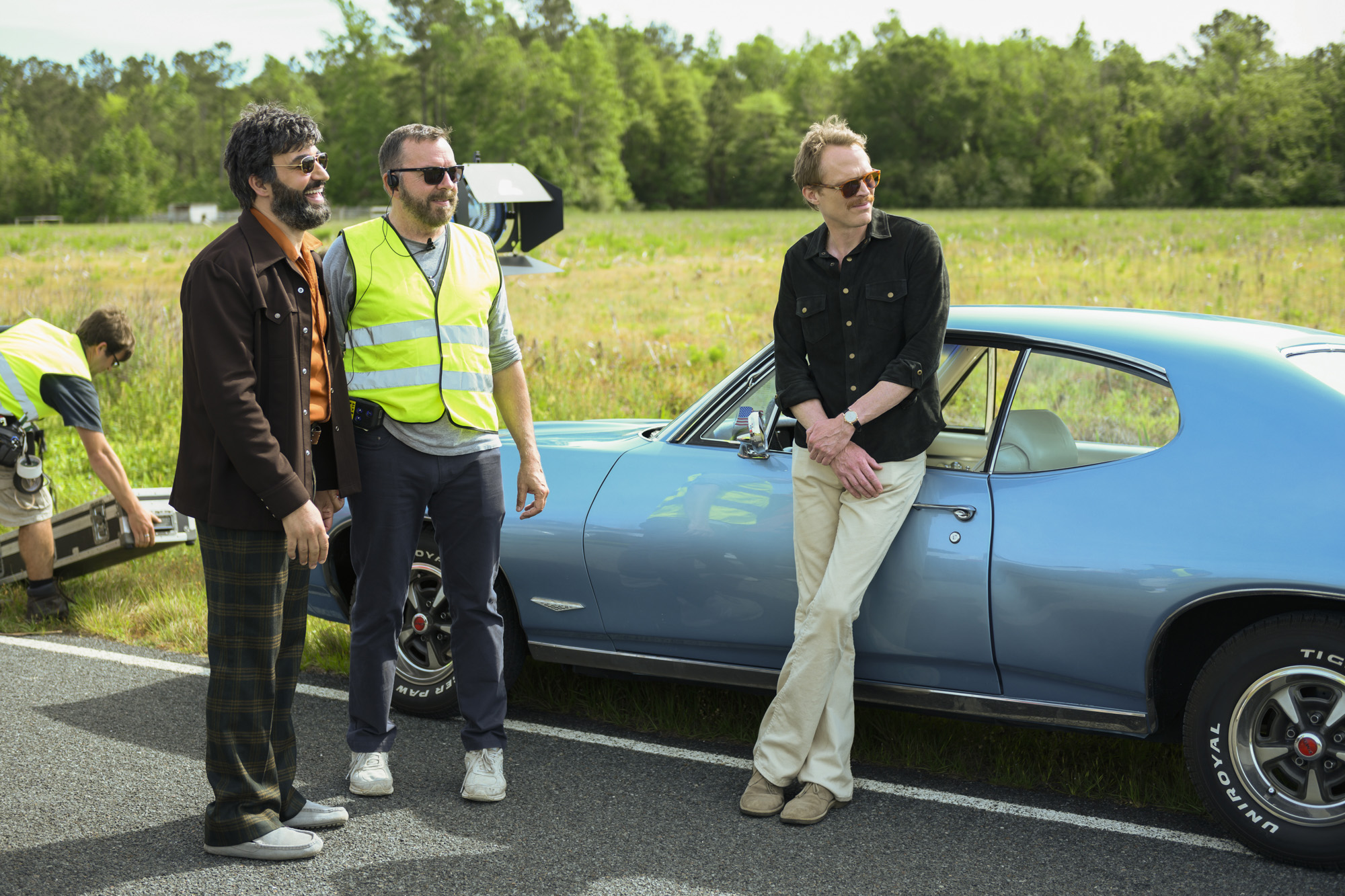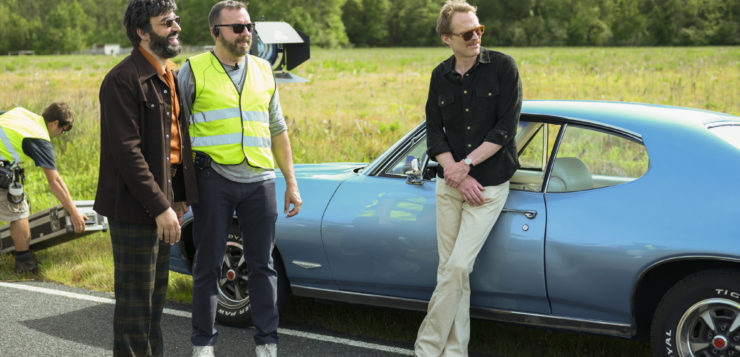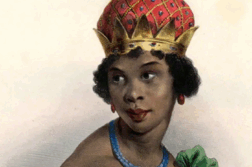AS A YOUNG BOY in Georgia, Alan Ball knew he had something to share about himself. He just wasn’t ready. At the age of thirteen, he experienced a devastating family tragedy that would change him forever. He began to write, and found that he could express himself and his emotions through writing.
You may recognize Alan Ball’s name from his association with the film American Beauty and the HBO series Six Feet Under and True Blood, all of which he both wrote and produced. American Beauty, which won the Oscar for Best Picture in 2000, weaves together a number of subplots, one of which concerns the central character’s next-door neighbor Frank, a tyrannical ex-Marine, and his handsomely mysterious son Ricky. It is Frank who harbors a deeply repressed homosexual secret that erupts in tragedy in the end. Six Feet Under (2001–2005) features a gay character named David Fisher, who evolves over time from outdoor cruising to moving in with his longtime partner Keith. True Blood (2008–2014) is a horror-fantasy drama one of whose main characters, Lafayette (played by the late Nelsan Ellis), is flamboyant to a fault; and he is far from the only gay character.
Ball’s latest film, which he both wrote and directed, is a comedy-drama called Uncle Frank (Amazon Studios). The film is about a gay professor living with his partner in New York City who returns to his roots in South Carolina, and it’s scattered with bits and pieces from Ball’s own biography. In the film, Frank’s partner is played by Peter Macdissi, Ball’s partner in real life.
This interview was conducted on-line in April.

Ilana Rapp: Growing up in a small town in Georgia in the ’60s and ’70s must’ve been tough for a gay kid. What made you decide to publicly come out when you were 33 years old?
Alan Ball: I never thought of it as “publicly” coming out. I was not any sort of “public” person at the time. I was coming out to my mother, as a first step in coming out to my family. All of my friends and colleagues knew already.
It was a long hard road for me to come to terms with my sexuality. I tried for years to be, if not straight, at least bisexual. I was born in 1957, and I completely bought into all the anti-gay propaganda that was codified in religion and politics and pop culture as I grew up. It took me years of life experience and, yes, therapy to get to a place where I embraced myself as I was. Incidentally, when I did come out to my mother, who was 77 at the time, she grabbed her head like Macaulay Culkin in Home Alone, like, if she didn’t hold onto it, it was going to shoot off into space. And she said: “Oh, God has dealt me some blows in this life.” I started laughing, because, really, what else could I do? And then she said: “Well, I blame your daddy for this, because I think he was that way, too.” Something clicked in my brain, like puzzle pieces falling into place. My father was already dead at the time, so I will never know if she was right about that or not. The next day, she and I were driving around north Georgia visiting dying relatives, and we passed the lake in Vogel State Park, and she said very nonchalantly: “That’s where Sam Lassiter drowned.” I had never heard of Sam Lassiter, so I asked who he was, and she replied: “He was a real, real, real good friend of your daddy’s.” I later learned my father and Sam were part of the Civilian Conservation Corps that built Vogel State Park in the 1930s. They were both from Asheville, North Carolina, and after Sam drowned, my father accompanied his body on a train back to their hometown. The possibility of what might have transpired between them knocked around in my head for years, and eventually became my film Uncle Frank. As to not wanting to come out as I was growing up, I didn’t know what coming out was, or that it was even an option. And although it took me longer than most to come out, I do believe it was the single biggest step I took toward mental, emotional, and spiritual health, and I have never regretted it. IR: A lot of your screenplays deal with secrets, emotional pain, family trauma, and conflict. Give us some insight as to what kind of people make up your audience. Do you tend to write for your audience, or do you pitch ideas that you simply want to do? AB: Over the years, I have been asked what my work is about countless times, and the answer I’ve come up with, which I believe is accurate, is: it’s about the challenge to live authentically in a world that is increasingly inauthentic. I don’t really know who my audience is. I don’t think in those terms. I imagine there is a big lgbtq component, but I don’t think it’s limited to that. I don’t really write with a specific audience in mind. I think I write the kind of work that I myself would like to see. My process is pretty organic and instinctive, and I don’t really think about how something might be received when I am working on it. That seems more like marketing to me than writing. The story and the characters seem very real to me when I work—as if they’re being revealed to me. That’s probably a subtle form of madness, but there you go. IR: The gay undercurrent in American Beauty culminates in the outing of Ricky’s father, Colonel Fitts, played by Chris Cooper. You hinted at an autobiographical element in this film related to your father. Can you elaborate on that? AB: Well, I wrote American Beauty after my mother told me my father might be gay, and my father’s name was Frank, which is the name of Chris Cooper’s character in the movie, so I suppose that could be seen as autobiographical. But my father was a gentle man, not violent in any way, unlike Colonel Fitts. IR: During the eight-plus years of working on American Beauty, you switched to United Talent Agency and began working with your current features agent, Andrew Cannava. His advice to you was to work on American Beauty instead of the other ideas you pitched him, because he saw how passionate you were about it. Did you receive any negative feedback about American Beauty? AB: The script sold within a week, and there were multiple offers besides the one from Dreamworks. A lot of passes. After the film was shot, I remember everyone saying, “Oh, how are we going to market this, it’s so dark,” which I found odd, because it really didn’t seem that dark to me. And there were some pretty nasty reviews, as well as over-the-top glowing ones. I had developed a TV show for ABC called Oh Grow Up that flopped, right around the same time American Beauty premiered. They were both listed in People magazine’s “Best and Worst of 1999” issue. You literally saw American Beauty on the best list, and on the back of that same page, Oh Grow Up was on the worst list. It was a great lesson in balance for me. IR: In True Blood, the character Lafayette is flamboyant and over-the-top, as opposed to Colonel Fitts in American Beauty who is masculine and closeted. Which character was more fun to write? More broadly, when creating characters, what formula do you use to create a character will hold the audience’s attention? AB: Well, definitely Lafayette was more fun to write, as he was a character who fully embraced himself, and he didn’t have that bottomless pit of self-loathing that Colonel Fitts did. And he was funny. I cannot take credit for Lafayette, though, as he was already a fully formed character in the source material, the Sookie Stackhouse novels by Charlaine Harris. And a lot of Lafayette’s best moments were ad-libbed by the late Nelsan Ellis, the amazing actor who portrayed him. I don’t really have a formula when it comes to creating characters. I like it when a character’s behavior surprises me. We’ve all seen so many thousands of hours of filmed entertainment, and there are certainly types—stereotypes, archetypes—that we’ve come to recognize, which feel familiar and comfortable, and highly predictable. I like discovering ways in which a character can surprise me, or at the very least, be specific, and not just “hero” or “villain.” IR: When you took on Six Feet Under, how long did it take you to respond that you wanted the show? AB: I responded to the idea immediately—I had spent a fair amount of time in funeral homes growing up, and the surreal atmosphere that funeral homes seem to share had registered pretty deeply in my psyche. But I was still running Oh Grow Up, which hadn’t been cancelled yet, so I was not available and had to pass. When Oh Grow Up did get canceled, I was extremely disappointed. I went back to Georgia for the Christmas holiday and ended up writing the Six Feet Under pilot on spec. When I got back to L.A., I called Carolyn and said: “Remember that funeral home show you pitched me? Well, I wrote it.” I was very happy when HBO responded positively to what I had written.
IR: In Six Feet Under, one of the main characters, David Fisher, (played by Michael C. Hall), was gay—but struggled before coming to terms with it. Tell us about David’s development and his significance as a character.
AB: Certainly I think David was a way for me to process my own arduous journey toward embracing being gay. When I wrote the pilot, I just tried to open as many doors as I could in terms of possible storylines, and didn’t really know where things were going to take the other characters. But I always knew David’s journey was one of self-acceptance, and the most important person he needed to come out to was himself.
When I was in my twenties, I used to watch a soap opera, and when one of the male characters came out of the closet to a woman who was romantically interested in him, it kind of rocked my world. Representation is important. But after he came out, he was relegated to being a sounding board for the women characters, and when summer came, and all the other hunks took their shirts off to hang out at the yacht club, he always kept his shirt on. It was as if seeing him shirtless, and acknowledging him as a sexual being, was just too much. And of course he never had any romantic storylines himself. The message was clear: gay characters needed to be made “safe.”
My first job in Hollywood was on the sitcom Cybill, in which there was a gay waiter at the restaurant Cybill Shepherd and Christine Baranski frequented. He didn’t even have a name. He was just “Waiter.” We eventually wrote an episode where he came out to his parents, but he still remained nameless.
In American Beauty, the two Jims [a gay couple]who lived next door to Kevin Spacey and Annette Bening really weren’t fully developed characters, but at least they were there. When I created my own sitcom, the aforementioned Oh Grow Up, one of three roommates who shared a Brooklyn brownstone was a gay lawyer who was in the process of leaving his wife after realizing he was gay. But there was something “abridged” about him, just as there had been with the character on the soap opera I watched.
David Fisher was very significant to me in that he was the first gay character I created who was fully front-and-center in the world of the show he was in. And because the other writers and I were no longer under the constraints of being on network television, we were able to explore him in ways that felt—to me, at least—more refreshing and honest than I had been allowed to do in the past. Not just in terms of depicting his sexuality, but in how psychologically complicated he could be.
IR: More recently, your film Uncle Frank was released on Amazon and is more explicitly gay-themed than some of your earlier work. Have you noticed a shift in the entertainment world, as well as the larger world, regarding LGBT characters being more in the forefront of the story than secondary players?
AB: Absolutely, there has been a shift, not only in the entertainment industry but in the culture at large. I spent a lot of my time during the pandemic watching television, a lot of international series, and it seems as if shows without any gay characters or content are in the minority. Sometimes, frankly, it feels a little gratuitous—oh by the way, this minor character is gay, so let’s see him having sex with another guy for a few seconds. But I much prefer there being minor gay characters to none at all.
I would attribute the shift to the fact that most lgbtq people choose not to remain in the closet any more. It’s a lot harder to be a raging homophobe when someone you know and like or even love is gay. Plus, I think the right wing really overplayed their hand during the whole gay marriage debate, and were so obviously using it as a wedge issue to win elections. It became obvious how cynical and hateful they were.
IR: I know you’ve experienced traumatic loss in your life. Is it ever possible to move past grief? What role does writing play?
AB: When I was thirteen, my sister was driving me to my piano lesson, and she pulled out in front of an oncoming car which plowed into us and killed her instantly. She was my favorite person in the world, the one who most saw me, I think, and in a second she was just gone, forever, and I was covered in her blood.
I’m not sure one ever moves completely past trauma like that. Of course, I don’t know that for a fact; I’m only one person. But in my own experience, it seems every time I encounter loss, every other loss I’ve experienced is brought right back up to the surface. Part of my journey has been to learn how to sit with my grief, without feeling like I have to chase it away, because I know it always comes back. I try to meditate every day, to practice being in the present moment, something I have gotten only slightly better at after years and years of doing it.
I sometimes wonder if being a writer is an attempt at being in control in ways that we just aren’t in reality. Or maybe it’s just a longed-for escape from actual life, with all of its genuine terrors and heartbreak. But then, I’ve always had a vivid imagination, and a drive to create characters and worlds, even as a child, way before anything happened to rip my world apart.
The fact is, everything we love we will eventually lose, including ourselves. How do we live with that? I guess the same way all the billions of people who have come before us did and those who come after us will. We just keep trying. Stumbling blindly forward.
IR: You’ve been professionally involved in show business for over 25 years. So many people try to break into the business, whether it’s behind the scenes or in front of the camera, but they don’t last. What did you do to sustain your career?
AB: I am not sure that I did anything consciously to sustain my career. I was lucky enough to have several projects be successful, which certainly made those in power more willing to give me other chances. And I self-generate a lot. One of the great things about being a writer is that you don’t have to wait for someone to give you permission to work. I have several scripts sitting around that I’ve written over the years. It doesn’t mean anyone wants to finance any of them, unfortunately.
IR: What advice do you have for young LGBT screenwriters?
AB: My advice to all screenwriters, is simple: don’t think about what’s going to sell. Write about what matters to you. Write about what you think is important.
Ilana Rapp, a Gen-X’er based in New Jersey, writes entertainment pieces for Casting Networks, Casting Frontier, NYCastings, Mupo Entertainment, and New Jersey Stage.





